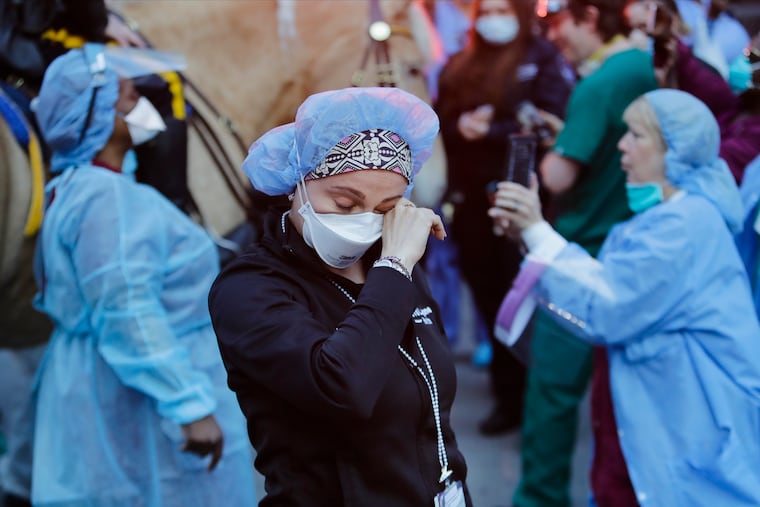Neurosurgeon on the front lines of COVID-19 sees grace under pressure
Community is like gravity in this way. It holds us all to Earth, a counterweight to the uncertainties brought by the coronavirus.

I’m a 50-year old neurosurgeon. That’s a pretty unremarkable fact. Nevertheless, at 50, I’ve had some time to think about my own mortality. When I held each of my daughters for the first time, it was clear that they would probably be here longer than me, and in 22 years of neurosurgery, I’ve witnessed the end of life up close, too many times to count.
Safety at the bedside is personal. No one can unload that risk, only minimize it. I work with young men and women who have little kids and no life insurance. Why would they? They’re not even 40. I ask them not to scrub with me for COVID-19 patients and they agree. In the 1990s, when I was training, my older supervisors and mentors shooed me out of cases where the patient had HIV. They were minimizing my risk, and now I do the same for my team.
The process for putting on and taking off personal protective equipment (PPE) for surgery is extensive, including a shower, and I know factually that PPE works. Internal data suggest it. Still, I wonder what the viral load of bone dust is in our infected patients and how much I’ve been exposed to, because I make a lot of it on the way to the brain.
It’s a new and niggling uncertainty. Should I quarantine myself? What if my wife gets it? What if I’m an asymptomatic carrier? Many other clinicians have the same thoughts, and I suppose this is a long, familiar uncertainty for first responders.
But then I think of the community that surrounds us. My cousin in Manhattan sends rooftop videos of the 7 p.m. daily cheer. Organized as a shout-out for essential workers, it’s really two million people hugging each other virtually. Dry cleaners make masks, neighbors run for groceries, medical students babysit for other health workers’ children. Nurses idled in their own work sign up for service in hot spots. Tech founders and CEOs collect and donate personal protective equipment, and the list goes on.
Community is like gravity in this way. It holds us all to Earth, a counterweight to the uncertainties brought by the coronavirus. Maybe this immutable force could be part of our new normal. Then again, being a neurosurgeon requires a dose of optimism mixed with a sense of what’s achievable.
Some media reports characterize health workers as scared or frightened. Everyone I’ve encountered in our hospital has been intrepid and professional in a challenging work environment. That’s grace under pressure. Maybe that’s because the places where I work are forward and proactive about their duty to worker safety. The PPE supply is present, but fragile, and the hospital is transparent about it. I know it’s not like this everywhere. I’m fortunate to work in a place with a strong institutional culture, but it’s disappointing that fortune has any role. Why can’t all of our institutions be strong?
We’re all careful. We trust our training and the PPE. My mask protects you and yours protects me. What else is there to do? Social distance, wash hands, disinfect surfaces, stay home, and trust the PPE to fend off a 100 nanometer particle. But it doesn’t go far enough to preserve our sense of order.
Buying toilet paper and baking yeast helps us to feel better, but strong institutions and steadying communities turn out to be important. They’re our best collective defenses against the coronavirus, more than we can do alone. When we look back on all of this, the core stories of this virus will be the ones of suffering and adversity. Most of us will carry on, though, laden with the memory of this time and a new uncertainty, buoyed or foiled by the organizations around us. Those are important stories to tell, too. In the meantime, health-care teams are here at work, donning our PPE, and doing the best we can each day to keep our patients — and ourselves — safe.
Patrick Connolly is a clinical associate of neurosurgery at Penn Medicine and neurosurgery chief at Virtua Health. The opinions expressed in this article do not represent those of the University of Pennsylvania Health System or the Perelman School of Medicine